- Home
- Jane Lebak
Pickup Notes Page 15
Pickup Notes Read online
Page 15
Anyway, the stutter paled in comparison to Josh drawing a birthday cake in the middle of the table. He started putting forty-eight candles on it. “For both of us.”
Quite an undertaking. “Should I set it on fire and make a wish?”
He shook his head without looking away from the candle-making ceremony. “Wait until www-we have a full p-pitcher of www-water.”
Our meals were unremarkable, but I wanted to keep the paper with Josh’s drawing of a cello plus a smiling face. His scribble of a cello and a viola surrounded by notes (which I amused myself by trying to read) and another scribble of hedgehogs nibbling tiny mites in my viola bow.
His hedgehogs were circles with spikes and a pointy face. I frowned. “When it comes to being an artist, you’re a great cellist.”
He twisted in his chair, pulled something from his coat pocket, and handed it to me. A box, wrapped in shiny red paper.
“But we don’t do that!” I exclaimed. “I didn’t get you anything.”
Josh said, “I-i-i-it’s not an eee-even exchange kind of thing.” He forced a smile. “We c-could sw-wap twenties if you prefer.”
Cheeks aflame, I opened the paper to find the Beethoven Duet for Viola and Cello in E-flat, sometimes called the Eyeglasses Duo, paired with the Hindemith duet for viola and cello. “Oh, thank you!” I hugged him. He smelled like cologne and Irish Spring soap.
He seemed flustered, so I focused on the CD. “You think these guys play better than us?”
He smiled. “How c-c-c-could they? We’re pros.”
At the end of the meal, I suggested bringing dessert home. Josh left a huge tip, and we trekked to the bakery to get a birthday something.
In line, I found myself following the radio and transposing the pop song into a violin solo. I’d begun doing that for the usually-hilarious results. This time, though, as I heard the opening of “Head Over Heels,” I stiffened.
Josh frowned at me.
“Listen.”
I could see him doing the mental arrangement as he listened. “It could be done,” he said. “C-c-c-c-c—” He stopped, took a gasping breath, tried again and this time he blocked. I backed half a step away and looked out the window. He closed his eyes, and finally he forced it: “Could you c-c-c-ome back to my plll—”
I’d never told him how it felt watching him fight to finish a sentence when I knew what he was trying to ask, when others would turn and wonder what was his problem, and when I knew I could spare us both by interrupting and answering yes.
He switched words to “—apartment and work on it with me?”
My skin crawled as the baker stopped tying a box with bakery string to stare. With my voice a little too low, I said, “Sure—sounds great. I’ll need to grab my viola.”
The line moved to the bakery counter, and we selected slices of cheesecake. Josh got a cannoli for his father, working hard to get out those initial C sounds. Because Josh had picked up the check at the restaurant, I paid for dessert, struggling to ignore both the price and the heat in my cheeks.
Back at home, I dashed upstairs for my instrument, then refilled the cat food, amusing Josh by talking to the suddenly-appearing consumer of said food. The cat wore a death-eating glare: Do not touch my kibble, tall one.
Josh said, “He’s got attitude.”
I smirked. “Enough for all three of us.”
“Has he g-got a name?”
By now it was a stock response. “What’s the point of naming something that doesn’t answer?” I touched his arm. “Let’s go!”
On the bus, we discussed the parts. We practically ran the last block to his apartment and up the stairs. While I petted the hedgehogs in their cage and ended up getting quill-stabs, he downloaded the song from iTunes. A few minutes later, he had his cello between his knees, and we tuned to each other.
He decided what key it was and began picking out notes, then repeated them a few times. We back-and-forthed about what the keyboard was actually playing. It sounded weird in the cello’s deep tones. Weird, but not bad.
He opened Sibelius and set down a framework of notes as a guideline.
Standing so I could see over his shoulder, I tried the guitar part. I missed horribly the first time, and we both flinched. He started over, and this time I nailed the opening.
“Good,” he said. “I thought I was going to get a nnn-nosebleed.”
“Hush, you.” By now we could play something that resembled harmony, although the opening sounded distorted. Josh smiled as he played. I loved watching him do that, as if he’d escaped the world the same way I did.
“This will sound awesome.” I leaned over his shoulder to get a better look at the screen, and he turned toward me. “Oh, that’s what I’m doing wrong.” I tried again, experimenting with a different position. “I think I can do it.”
I counted us to start, and we took it slowly. The two lower voices of the quartet gave the passage a richness you didn’t get with the violins.
When we stopped, I caught him looking up at me, his eyes alive, his smile broad.
My heart raced. “What?”
He looked away. “You’re a good violist.”
I pivoted away, because I wanted to believe he really believed that I was an equal partner in our group. I wasn’t as good as him. I knew that, but he’d never hurt my feelings. So I only said, “Thanks. You’re a good cellist.” I pulled over a chair and sat near him, but when the silence went too long, I broke it. “You should get this arranged. It’ll sound awesome on the violin.”
Josh’s mouth tightened. “I’m tired of Harr-rison getting all the good things.”
I leaned forward. “First violin tends to hog all the cool stuff in a string quartet.”
Josh didn’t reply.
I picked up my viola, and after a hesitation, Josh joined me.
THIRTEEN
The next morning, I awakened to the creak of my apartment door.
Next thing I knew, my mom was in the kitchen. I hauled myself to my bedroom door. “What are you doing?”
“I’m visiting. Can’t a mother see her daughter?” She went past me to my living room and studied the decoy viola.
As her gaze fell on it, I recoiled: when I’d staggered in last night, I hadn’t hidden my grandfather’s. It was in my bedroom. Right in front of my dresser.
“I need to get dressed.” I fled to my room, slammed the door, and slid the viola under the bed.
No, no good. She’d look there. I shoved it into the dresser and piled underwear over the case, then pulled on some clothes. I came back out to find her looking in my closet.
Viv and Zaden had followed. “You should have spruced this place up,” Viv said. “It’s a pit.”
I glared at her. “Good thing you’re not living here.”
Mom said, “I could have done wonders with these rooms.”
Yeah, for her clients. “What do you want?”
“Oh, don’t tell me you’ve turned into one of those girls who wants nothing to do with her own mother.” Mom gave a pained sigh. “Come downstairs and let’s catch up.”
My mother hadn’t “caught up” with me for two presidential administrations. Maybe she’d had a fight with Dad and wanted to shore up an ally. But no, I’d bet Mom wanted me downstairs so she could prowl in peace.
Viv took my milk and turned on her toes. “I’ll just grab this for Zaden.”
Mom said, “You know, your grandmother’s home is spotless. I’ve been supportive of your goth lifestyle, but is it really necessary to be a slob?”
My blood pressure soared. I could feel it in my ears.
She took my hand. “See? You even bite your nails.”
I pulled back. “You have to keep your nails short to play viola.”
“Oh, please don’t lie just because you’re ashamed. You always used to bite your nails.” Mom sneaked a glance in my bedroom. “If you took a little pride in yourself, maybe you’d meet a decent man. Remember when all you had was that nice brain-damaged
boy?”
I went numb, no floor under my feet. Everything was liquid.
Viv called upstairs that the coffee was ready. Mom left, saying to come and chat, and in her wake I felt like someone the newscast interviews after a tornado. Tell me, how did it feel when the winds came?
I went to my decoy viola. Moved, but not opened.
That nice brain-damaged boy?
Voices floated up the stairwell, helium balloons detached from their strings. My grandfather’s viola used to sound that way, a voice wandering the walls until it lost all meaning and only let you know its presence with a muffled indistinction.
That was a comfort. This? This was—an infestation.
My eyes drifted toward my dresser, and two thoughts collided like cars rear-ending at an intersection.
First, that I needed to play right now.
And second, that my mother would have taken my viola.
If I hadn’t been here right now, I’d never have seen it again. She’d have taken it and pawned it because it belonged to her by whatever logic she felt like using. Maybe someday I could replace it, but it wouldn’t be Grandpa’s.
In a flash, I pulled on my jacket and boots, then slung my grandfather’s viola over my back. My keys and my cell phone went into my purse along with my wallet. And then, footsteps masked by their voices, I locked my door (futile) and sneaked to the street.
Around the corner, I ducked into the first store, a Hallmark, and surrounded by pastel cardstock for strangers to tell strangers how special they were, I struggled to get my bearings. I could go to the library.
But being alone right now—no. I pulled out my phone to dial that nice brain-damaged boy.
Immediately I hung up. I stood, phone in hand, eyes closed.
Damn it all. I hated that my mother broke into my apartment. I hated how she forgot I existed until she wanted something, and then I only wished she’d forget me entirely. I hated being an orphan while my parents were both alive. I hated it all.
I left the greeting cards and took the subway. Harrison taught all morning on weekends, and he’d keep my viola if I asked.
Even with the car pretty much to myself, I clutched my viola against my chest. As quickly as I’d left, I hadn’t grabbed a book, so it was just me staring at a wall full of hemorrhoid removal ads. The rocking motion soothed, and I wished the world would disappear into the subway sound.
Half an hour ago, I was still sleeping. Damn it.
I let myself into Harrison’s apartment to find a familiar scene: a girl by the windows, her half-size creeping note by note through a minuet from Suzuki Method 1, Harrison watching her bow technique, and a parent sitting on the couch. A parent who cared.
When she finished, Harrison circled one of the notes with a pencil, speaking animatedly about the things the student did right (according to him, plenty) and then suggesting changes.
That done, he turned to me. “Ah, my lovely bride!”
As the mother’s head swept up, I said, “I’m not marrying you, Harrison.”
“Oh, right. I keep forgetting,” he said, and the girl giggled, “How could you forget that?”
He continued the lesson while I sat beside the fishtank. Harrison used the tank as a room divider, and the thing was huge. He’d told me all the fish in it once upon a time: discus fish, angel fish, German blue rams, a school of rummy nose tetras, and one zebra pleco to rule them all. None of it made sense to me, but I liked the bubbly sound of the filter.
Drinking the coffee I picked up on my walk from the subway, I absorbed his encouragement, the child’s enthusiasm, his observations. Oh, those early lessons, the trepidation of a new technique followed by the triumph of mastering it. The days when, if only I practiced enough and learned enough, I’d play solos at Carnegie Hall and my parents would sit in the front row.
Ten minutes later, the lesson ended. The next student arrived, and the room busied with the sounds of setup and cleanup.
I stood as Harrison came over.
“I didn’t expect you today,” he said in a low voice. “Not that I mind, but did I forget something?”
“I had to leave my apartment. Visitors.” I stared at the floor. “If I stay here—”
I couldn’t keep going.
Harrison’s eyebrows raised. “If you stay here...will I sell you into slavery? Will I make you teach?”
I forced out, “Will you not ask any questions?”
His face softened. “Sure. You might want to hang out in the bedroom, though. I have one more student after this, and it gets noisy.”
That’s how I ended up in a room I’d avoided for two years, set up with a TV remote and an invitation to watch anything I liked. Yes, he had two TVs in a one-bedroom apartment, with an assortment of exploding-thing movies and some sitcoms on DVD. He wasn’t a bookish person, but he had a few (two-thirds of them violin technique). There was also another resident: a single gaudy fish in a tank smaller than a bathroom bucket, its fins so drapey I wondered how it could swim at all. That hadn’t been here last time. He’d made his bed and no laundry was in evidence, clean or dirty.
Then, before I’d decided what to do, I heard the sweetest sound in the world: Harrison tuned his student’s violin. I couldn’t help smiling as I remembered my grandfather tuning my viola long after I could tune it myself. That familiar twang, then the repeated smaller twangs up or down, then two strings bowed together for a perfect fifth, the whole process repeated three times until the instrument answered as it should, then everything rechecked (because invariably one string’s adjustment threw another out of whack) and at last four bold bow-strokes before the instructor handed it back with the classic, “Show me what you’ve been doing.”
I finished my coffee, then curled up on the bed, viola case in my arms, to stare out the window.
I didn’t want to disrupt the lesson. But I wanted to play. I opened the case and moved aside the blanket to rest my hand on my prize, my purpose embodied in one and a half pounds of wood. It’s okay, Woody. We’ll get through this.
Eventually I scanned a hundred channels until I found a comedy I’d watched as a kid, the only thing that didn’t make me want to vomit. With it playing, I stared at the fish in its tiny tank, swimming around its smooth river rocks and through a shattered urn in a glass apartment, never anywhere to hide and always completely alone. There were dozens of fish in the living room tank. Here was only one, so beautiful and so hidden.
Eventually the door opened, Harrison appeared, and I realized the apartment had gone silent. “Come on. I’ll buy you lunch.”
In the living room, he pointed to my voila. “That can stay. I won’t make you sing for your supper.”
Embarrassed, I locked the viola in the closet with Harrison’s violins and Josh’s practice cello. Ten minutes later, we sat half a block away in a Japanese restaurant, the same place he’d taken me the night before we broke up. Harrison recommended a platter of sushi to split.
I felt light-headed. I hadn’t eaten anything today.
“I love these things.” Harrison pulled apart his disposable chopsticks with a balsa-wood snap. “Okay, talk to me.”
I shook my head.
He leaned forward, eyebrows arched. “You hid out in my apartment, watching TV of all things, acting like your life savings was in your viola case. Unless you’re fleeing a mad scientist who wants to finish a personality transplant, I’m at a loss.”
I forced a smile. “Am I that bad?”
“You’re just so…” He paused. “I hoped if I put food into you, you’d feel better, but now I’m wondering.”
I looked out at the street.
“The legal situation seems scary, but remember, sounding scary is their job the same way playing wrong notes in the low register is your job.”
“It’s not the lawyers.” I couldn’t focus. “I wasn’t even thinking about them.”
Dead silence. Finally, “Why did your viola come with you?”
“I didn’t trust the people Grandm
a had over.”
Harrison recoiled. “They’d damage it?”
“They’d take it.”
“Lock your apartment!”
I bit my lip. “Grandma gives them the key.”
His eyes widened. “Change the locks!”
Gaping, I wrenched my gaze inside. “My grandparents would flip.”
He looked venomous. “Every landlord has to give reasonable notice before anyone enters.”
Son of a lawyer. “Well, mine doesn’t, and they’d steal my viola.”
“That’s when you call the police and have them get it back.”
I flinched. “But they’re relatives.”
He rolled his eyes. “Oh, and relatives never steal from anyone?”
For an instant, the world fuzzed, and my ears rang.
Harrison grabbed my hand. “Are you okay?”
I whispered, “I stole it first.”
He leaned forward. “Say that again?”
“I stole it. My grandfather died, and I knew my mother would never let me have it. But—it was his. So— It was the middle of the night—the day he died—and I still had the key, so I took the viola from his house, and I hid it.”
Harrison frowned at me. “It wasn’t yours?”
My mouth twitched. “He willed it to me, but my father was the executor, and he said I couldn’t take anything until the estate was settled. I went in and got it anyhow.”
Harrison clutched my hand so tight it hurt. “Joey, be clear here: your grandfather left it to you in the will?”
I nodded. “I told my parents he’d sold it to pay his doctor. But I stole it.”
“You can’t steal something that’s yours.”
He released my hand, and suddenly I could breathe. “What?”
“Your grandfather gave it to you. What do you think a will is? It’s a list of gifts to be given on condition of someone’s death. He gave you a gift, and you claimed it. How is that theft?”
I blinked, then whispered, “Really?”
“Really. You’ve lived with that guilt for how long? Well, I absolve you.” Even as my brain whirled, he cocked his head. “Did he leave you anything else?”
“Some money.” Harrison would have considered it pocket change, but Grandpa didn’t have much.

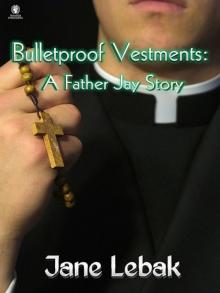 Bulletproof Vestments
Bulletproof Vestments The Wrong Enemy
The Wrong Enemy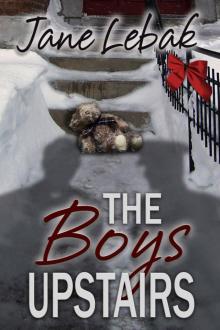 The Boys Upstairs (Father Jay Book 2)
The Boys Upstairs (Father Jay Book 2) Sacred Cups (Seven Archangels Book 2)
Sacred Cups (Seven Archangels Book 2)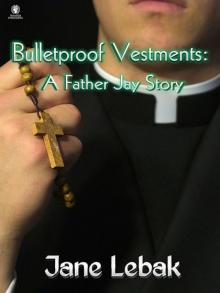 Bulletproof Vestments: A Father Jay Story
Bulletproof Vestments: A Father Jay Story An Arrow In Flight (Seven Archangels Book 1)
An Arrow In Flight (Seven Archangels Book 1)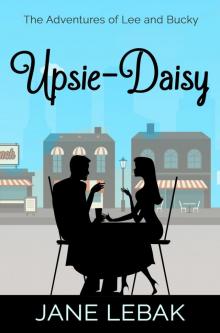 Upsie-Daisy
Upsie-Daisy Shattered Walls (Seven Archangels Book 3)
Shattered Walls (Seven Archangels Book 3)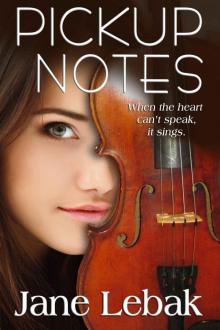 Pickup Notes
Pickup Notes